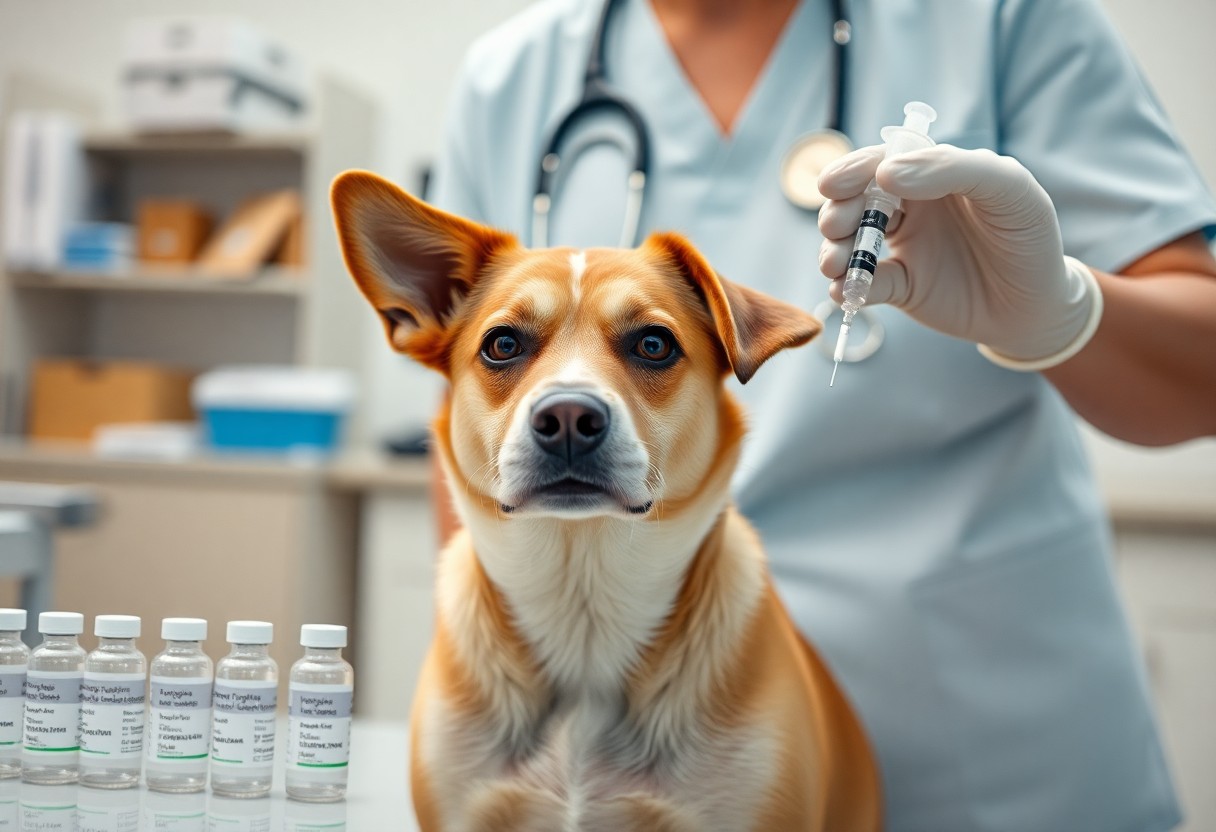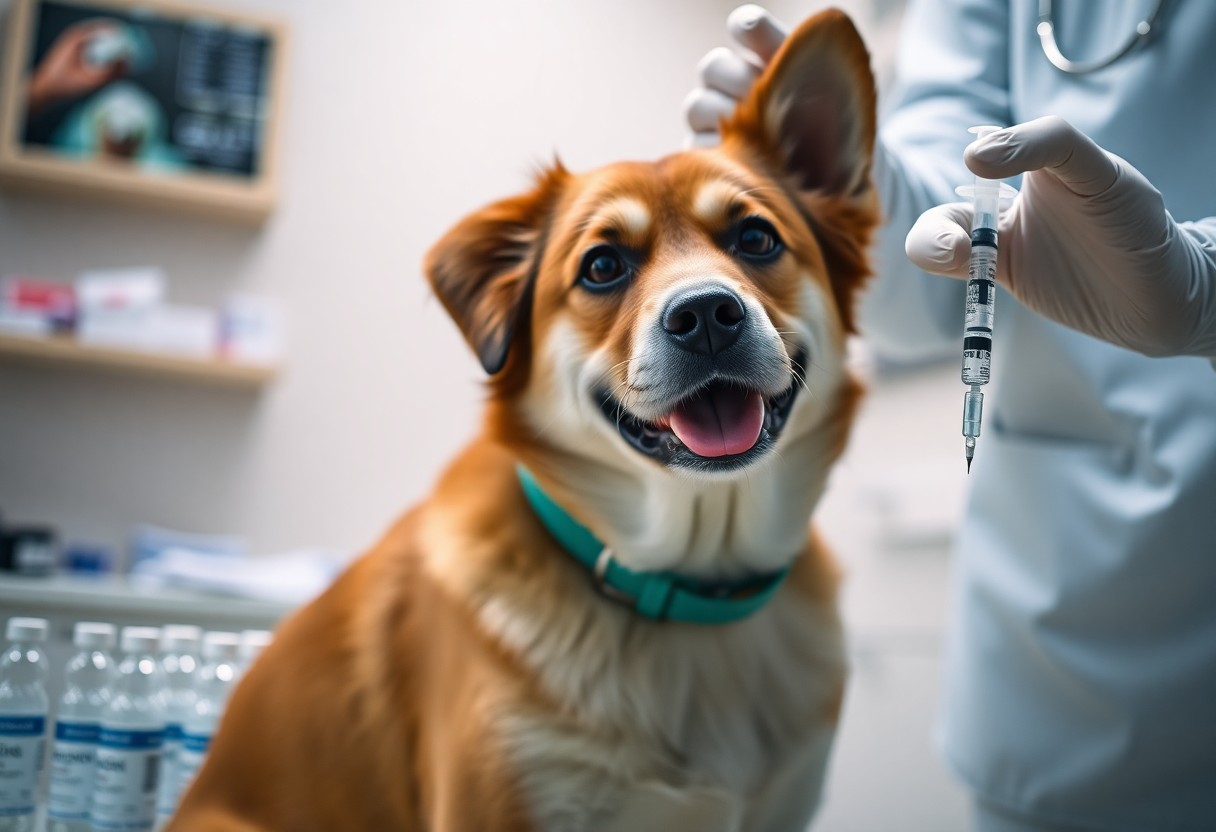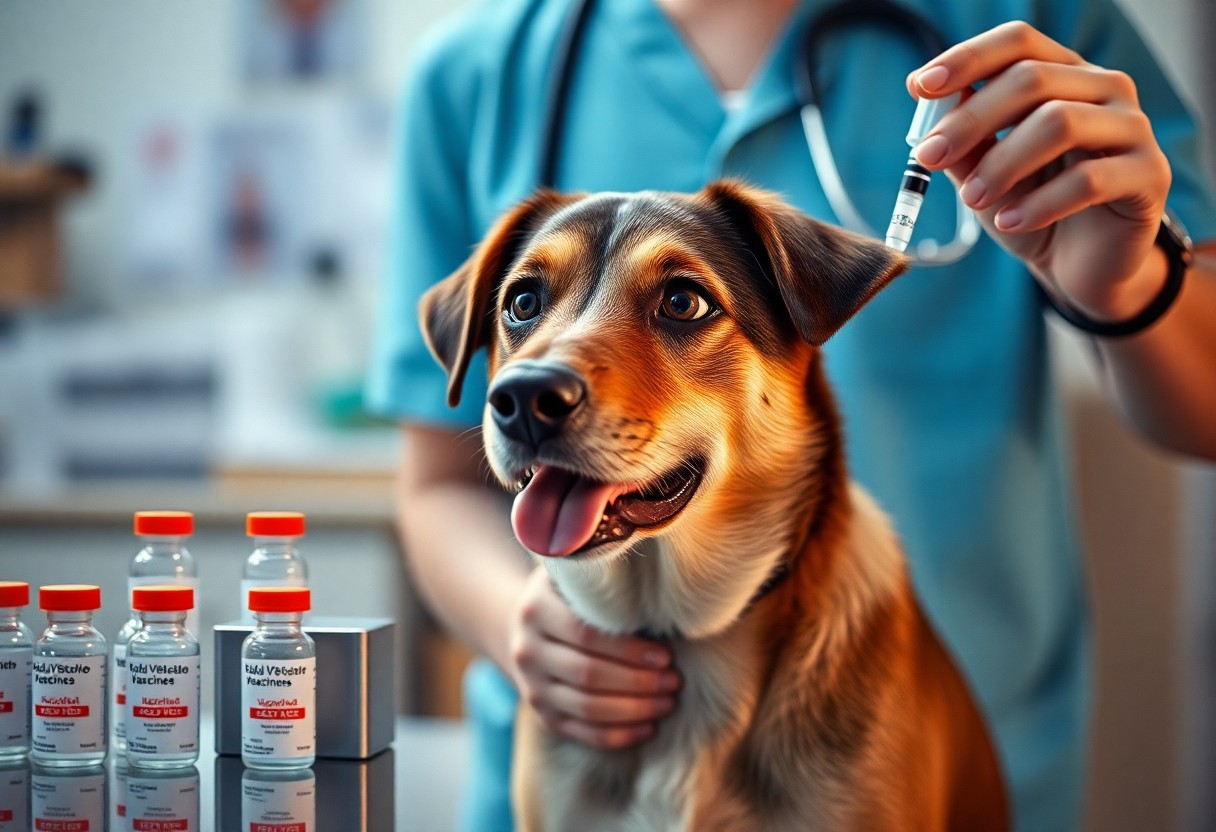Just like people, your dog requires certain vaccinations to stay healthy and protected from various diseases. You might wonder how many vaccines your dog needs throughout its life and which ones are crucial. This guide will help you understand the core vaccines necessary for your dog’s well-being, as well as optional ones based on their lifestyle and risk factors. By knowing the vaccination schedule, you can ensure your furry friend remains safe and enjoys a long, healthy life.
Key Takeaways:
- The number of vaccines your dog needs varies based on their age, lifestyle, and health status, typically starting with a series of puppy shots followed by annual or triennial boosters.
- Core vaccines commonly recommended include those for rabies, distemper, parvovirus, and adenovirus, while non-core vaccines depend on your dog’s exposure risk and environment.
- Consulting with a veterinarian is important to create a tailored vaccination schedule that ensures optimal protection for your dog’s specific needs.

Mapping Out Core Vaccinations
Establishing a clear vaccination plan often involves focusing on a core set of vaccines deemed necessary for every dog, regardless of lifestyle or geographic location. These vaccines defend against the most severe and common infectious diseases that could threaten your dog’s health. Tailoring this foundational schedule to fit your dog’s specific needs ensures optimal protection, preventing avoidable illness and contributing to public health.
Essential Vaccines Every Dog Needs
Core vaccines generally include rabies, canine distemper, parvovirus, and adenovirus. Rabies vaccination is legally required in many areas due to its fatal nature and zoonotic potential. Canine distemper vaccine protects against a highly contagious virus affecting respiratory and neurological systems. Parvovirus vaccination defends against a severe gastrointestinal disease, while adenovirus vaccine prevents infectious hepatitis. These immunizations form the backbone of proactive canine healthcare.
Vaccine Schedules: Timing is Everything
Vaccination timing hinges on age and immune status, with puppies typically receiving an initial series starting at 6 to 8 weeks, followed by boosters every 3 to 4 weeks until about 16 weeks old. Adult dogs may require boosters annually or triennially depending on vaccine type and risk factors. Following your vet’s customized timeline ensures your dog develops and maintains strong immunity.
Further refinement of vaccine schedules considers factors like local disease prevalence and your dog’s lifestyle. For example, dogs in high-exposure environments or those participating in dog sports may need accelerated or additional booster vaccines. Veterinarians often recommend blood titer tests to assess immunity levels, providing data-driven adjustments. Adhering to a tailored schedule reduces overvaccination and allays concerns about adverse effects while maximizing protective benefits.
1. Puppies need a series of initial vaccinations for full protection.
2. Core vaccines include rabies, distemper, parvovirus, and adenovirus.
3. Non-core vaccines depend on your dog’s lifestyle and exposure risk.
4. Annual or triennial boosters maintain immunity over time.
5. Consult your veterinarian for a personalized vaccine schedule.
6. Vaccinations prevent serious, potentially fatal canine diseases.
Understanding Lifespan and Booster Requirements
Your dog’s immunity duration varies depending on the vaccine and their individual health, so tailoring booster schedules is necessary. For example, vaccines like rabies may offer protection for three years, while others such as distemper require annual boosters. Each vaccine has a scientifically established effective period, but factors like age, breed, and lifestyle influence the timing for re-vaccination. Checking with your vet and monitoring your dog’s health ensures you don’t miss the window for maintaining robust immunity. For detailed timing, see Your Complete Guide to First-Year Puppy Vaccinations.
How Long Does Immunity Last?
Immunity from core vaccines often lasts between one to three years, though newer studies suggest some may provide longer protection. Non-core vaccines generally require more frequent boosters, sometimes every six to twelve months. The immune response can wane with time, so knowing the specifics for each vaccine—like parvovirus or leptospirosis—helps you keep your dog protected. Your vet can perform titer tests when appropriate, which measure antibody levels to decide if a booster is needed, avoiding unnecessary vaccinations while ensuring effective coverage.
When to Schedule Boosters for Optimal Protection
Scheduling boosters depends on the type of vaccine your dog received and their risk factors like environment and activity level. Core vaccines typically follow a schedule of initial puppy shots, a booster at one year, then every three years, but high-risk dogs might require more frequent updates. Non-core vaccines, such as those for Bordetella, may require annual or biannual boosters, especially if your dog frequents dog parks or grooming salons. Staying aligned with a personalized vaccination plan maximizes immunity and safety.
Consult your veterinarian for a booster timeline tailored to your dog’s lifestyle. Detailed records from your vet clinic can inform when the next shot is due, balancing protection and potential vaccine reactions. For instance, dogs participating in dog daycare might receive Bordetella boosters every six months, while those in rural areas need leptospirosis boosters yearly depending on local outbreaks. Adjusting this schedule as your dog ages ensures continuous immunity without over-vaccination risks.

Deciphering the Risks of Under-vaccination
Failing to vaccinate your dog adequately leaves them vulnerable to various severe illnesses, some of which are highly contagious and even fatal. Diseases like parvovirus and distemper can spread rapidly, especially in communal settings like dog parks or kennels. Without vaccines, your dog’s immune system struggles to fight these pathogens effectively, leading to intense symptoms and prolonged recovery periods. Referencing a Dog Vaccine Schedule: A Guide To Dog & Puppy Shot … offers detailed timing to keep your pet safely protected throughout their life stages.
Consequences for Health: What You Need to Know
Under-vaccinated dogs are at greater risk for diseases that can cause severe respiratory issues, neurological damage, and even sudden death. Prevention through vaccination reduces the likelihood of outbreaks of infectious diseases such as canine parvovirus, which can cause bloody diarrhea and dehydration, or rabies—a zoonotic disease that is fatal once symptoms appear. When vaccination lapses occur, you expose your dog to unnecessary health threats and increase the chance of costly emergency treatments.
Cost of Preventable Diseases: Beyond the Vet Bills
Treating illnesses that vaccines could have prevented often involves multiple vet visits, extensive diagnostics, and long-term medication, which drives medical expenses up significantly. Beyond vet bills, you must consider the emotional toll of watching your dog suffer and the possible impact on your ability to work or care for your pet during illness. Moreover, infectious diseases sometimes require quarantine measures, adding logistical and emotional burdens on your daily life.
For instance, a single parvovirus infection can cost upwards of $2,000 in emergency care alone, not counting lost workdays and medication. Rabies exposure mandates immediate and expensive post-exposure treatments, and in many cases, strict isolation protocols. These indirect costs, combined with the fear and stress of your pet’s suffering, underscore the broader financial and emotional implications of skipping vaccinations. Consistent adherence to vaccine schedules is a proactive way to mitigate these risks and protect both your dog and your household.
Special Cases: Tailoring Vaccination to Your Dog’s Lifestyle
Adjusting vaccine protocols based on your dog’s environment and routine can make a big difference in their health protection. If your dog spends a lot of time in places like kennels, dog parks, or frequents areas with high wildlife activity, they may require additional vaccines beyond the core series. Conversely, dogs living mostly indoors with limited exposure might need fewer shots. Consulting your vet to map out a vaccination plan tailored specifically to your dog’s lifestyle helps ensure they’re shielded against the diseases most likely to affect them.
High-Risk Environments: Dogs That Need More
If your dog regularly visits doggy daycares, participates in competitions, or lives near endemic areas for diseases like leptospirosis or Lyme disease, additional vaccines can provide necessary defense. For example, dogs in wooded or grassy areas with prevalent ticks should receive the Lyme disease vaccine. Also, breeds that hunt or track outdoors might benefit from extra protection against tick-borne infections. Vaccines such as Bordetella for kennel cough are also recommended for dogs with frequent close contact with other dogs.
Age and Breed Considerations
Puppies often start with a series of vaccinations every three to four weeks until about 16 weeks old because their maternal antibodies wear off gradually. Senior dogs might need booster shots less frequently, depending on their health status. Certain breeds, like Doberman Pinschers and Rottweilers, may have unique vaccine sensitivities or varying responses that require tailored protocols. Discussing your dog’s age and breed specifics with your vet ensures vaccination is both safe and effective.
Breed-related differences can influence both vaccine efficacy and the risk of adverse reactions. For instance, smaller breeds sometimes experience stronger immune responses, making careful dose management important. Some large breeds have slower immune system development, possibly extending the window for initial vaccinations. Age also affects immune memory; older dogs might have had some vaccines decades ago, so titer testing can guide whether boosters are necessary, avoiding unnecessary vaccinations while maintaining protection.

Consulting Your Veterinarian: The Key Partnership
Your veterinarian holds the most tailored insights about your dog’s health, including which vaccines are necessary and when. Based on your dog’s age, breed, health status, and local disease risks, they can craft a precise immunization schedule. Regular vet visits also help monitor any side effects or health changes related to vaccinations, ensuring your dog’s safety and wellbeing through every dose.
Importance of Professional Guidance
Veterinarians understand evolving infectious threats and vaccine developments far better than general resources. Their advice reflects current disease outbreaks in your region and adapts to your dog’s unique health profile. This expert perspective prevents over- or under-vaccination and ensures your dog receives protection tailored to actual risks rather than generic schedules.
Questions to Ask During Your Next Visit
During your vet appointment, inquire about specific vaccines recommended for your dog’s lifestyle, potential side effects, and the timing for boosters. Ask if there are new vaccines recently introduced or if some can be safely skipped based on your dog’s health history. Clarify how your dog’s age or breed may influence vaccine choices to optimize protection.
Expanding on these questions, you might also request information on the efficacy duration of each vaccine and how local disease prevalence factors into their recommendations. Seeking clarity on which vaccines are core versus optional helps you understand the rationale behind each shot. Discuss any concerns about vaccine reactions to better prepare for monitoring your dog post-vaccination.
Final Words
So, understanding how many vaccines your dog needs is crucial to keep them healthy and protected. Typically, your dog requires a core series of vaccinations in their first year, followed by regular boosters. The specific schedule can vary based on your dog’s age, lifestyle, and risk factors. To ensure your dog receives the appropriate immunizations at the right times, consult your veterinarian and refer to a detailed Dog vaccination schedule: Which shots they need and when. Proper vaccination supports your dog’s long-term well-being.
FAQ
Q: How many vaccines does my dog generally need throughout its life?
A: The number of vaccines your dog needs can vary depending on its age, lifestyle, and health status. Typically, puppies receive a series of vaccinations starting at about 6-8 weeks of age, with boosters every 3-4 weeks until they are around 16 weeks old. After the initial puppy series, most adult dogs require annual or triennial booster shots to maintain immunity. Core vaccines usually include distemper, parvovirus, adenovirus, and rabies.
Q: Are there any non-core vaccines my dog might need?
A: Yes, non-core vaccines may be recommended based on your dog’s environment, lifestyle, and risk factors. These can include vaccines for Bordetella (kennel cough), Lyme disease, leptospirosis, and canine influenza. Your veterinarian can help determine whether these are necessary by assessing your dog’s exposure risk, such as frequent boarding, hunting, or living in areas where certain diseases are common.
Q: How can I ensure my dog stays properly vaccinated over the years?
A: To maintain your dog’s vaccination schedule, keep an up-to-date record of all vaccines administered and follow your veterinarian’s recommendations for booster shots. Regular veterinary check-ups are important so that your doctor can monitor your dog’s health, review vaccination status, and adjust vaccine needs based on changes in lifestyle, health conditions, or emerging diseases in your area.
 wagwagtail "only love can make your dog wag her tail"
wagwagtail "only love can make your dog wag her tail"
